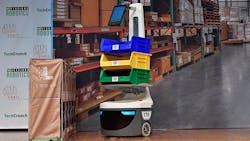Robot Makers Fill Their War Chests in Fight Against Amazon
A few years ago, Amazon.com Inc. triggered a robot arms race when it purchased a company called Kiva Systems, maker of automated warehouse robots. Now its would-be rivals are landing bigger and bigger cash injections to try to compete with the e-commerce giant.
Locus Robotics, a spinoff of a warehouse company that decided to build its own robots after the Amazon deal in 2012, raised another $25 million in venture capital, bringing its total funding to more than $33 million, the company announced last week.
The new cash for Locus followed a $15 million injection in July for 6 River Systems Inc., a robotics company founded by ex-Kiva executives. In March, China warehouse robotics startup Geek+, which boasts Alibaba as a client, raised $22 million. Competitor RightHand added $8 million in venture funding this year as well.
Warehouses are more plentiful than ever, as retailers and logistics companies scramble to add more space in more places. Retailers must get as close to their customers as possible, as shoppers order online more often and demand shorter delivery times.
Builders spent $2.6 billion on warehouse construction in September, more than triple what they spent in September 2012. Retailers and logistics companies are experimenting with robot workers in a bid to make these new industrial buildings more productive.
“Fulfillment warehouses are under tremendous pressure to meet increasing demands for fast, accurate order fulfillment in the face of significant labor challenges,” Locus Robotics CEO Rick Faulk said in a statement. “In an economy largely dominated by Amazon, Locus arms independent operators with the means to compete effectively.”
The warehouse industry employed 960,400 Americans in October, up 42% over the past decade, according to data from the U.S. Bureau of Labor Statistics. Now the industry is struggling to find the workers it needs: 219,000 employees were hired by transportation, warehousing, and utilities companies in September, while another 246,000 open positions went unfilled.
Robots aid workers with their tasks. Warehouse jobs are often grueling, as employees must walk miles across the floor picking up items and shuttling them to their destinations. Automation comes in several forms — Kiva’s bots slide across the floor like giant hockey pucks, latching onto pallets and shuttling them away; RightHand has a robotic arm that plucks items and drops them into boxes. As for the Locus bot, it exists to do much of the walking for workers, scurrying up to them with instructions on what they must pick from a shelf and place on the bot’s body.
Scale Venture Partners, a firm in Foster City, Calif., that invests in technology that modernizes the workplace, led the funding round in Locus, whose clients include DHL Supply Chain and Quiet Logistics.
By Kim Bhasin and Patrick Clark
About the Author
Bloomberg
Licensed content from Bloomberg, copyright 2016.
